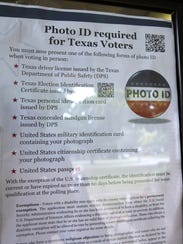The Supreme court docket dominated for the 2d time on Texas' strict photograph identity legislation.(photograph: Tamir Kalifa, AP)
WASHINGTON — The Supreme courtroom refused Friday to dam Texas' image id law, the strictest within the nation, from final in effect for now, however left open the opportunity of doing so this summer season if a lower courtroom challenge is still unresolved.
Civil rights businesses who say the legislation discriminates against black and Hispanic voters had argued that it'll be blocked because it become struck down by way of a federal courtroom in 2014 and a three-decide appeals court docket panel last yr. the total U.S. court docket of Appeals for the fifth Circuit will hear the case next month.
The justices stated they might reconsider their resolution on or after July 20 if the appeals courtroom has not determined the case by means of then. that would provide state election officials greater than three months to prepare voters for the November elections.
"The court acknowledges the time constraints the parties confront in mild of the scheduled elections in November 2016," the one-paragraph order brought up.
The legislation's challengers cheered the motion, besides the fact that it did not give them every little thing they sought. "We're very inspired that the U.S. Supreme court docket recognizes the time constraints worried during this case," stated Gerry Hebert, govt director of the campaign legal core.
It was the 2d time the high court docket had refused to block the picture identity law. In October 2014, the justices allowed Texas to enforce it in its pending November elections. That order become no longer signed, however Justice Ruth Bader Ginsburg filed a blistering six-web page dissent, joined through Justices Sonia Sotomayor and Elena Kagan.
"The most efficient chance to public self belief in elections in this case is the prospect of enforcing a purposefully discriminatory legislation, one that likely imposes an unconstitutional poll tax and hazards denying the appropriate to vote to a whole lot of hundreds of eligible voters," Ginsburg noted on the time.
The law is the strictest in the nation, enabling handiest certain sorts of photo id at the polls. Gun licenses are protected; college IDs are not. It become enacted to reduce down on in-grownup voter fraud, but critics referred to only two individuals were convicted of impersonating others on the polls during a recent 10-12 months period.
A federal district choose in Corpus Christi in the beginning struck down the law in 2014 after a two-week trial. decide Nelva Gonzales Ramos ruled it was passed through the Texas state Legislature in 2011 with a "discriminatory intention" and could disenfranchise about 600,000 voters, a disproportionate variety of whom are black or Hispanic.

Texas' photo identity law has been in impact for the reason that 2014. (photo: LM Otero, AP)
Days later, a three-decide panel of the U.S. court docket of Appeals for the fifth Circuit blocked Ramos' order from taking impact whereas the state appealed, and the Supreme court upheld that ruling. because of this, the photograph identification requirement has been utilized in state and native elections regardless of the continuing court docket challenge.
A federal appeals court docket panel agreed final August that the legislations changed into discriminatory however urged the two sides to get a hold of a compromise plan. Then ultimate month, the whole appeals court decided to rehear the case, now scheduled for can also.
Civil rights businesses had requested the Supreme court to stop the legislation from being carried out meanwhile, out of subject that preparations for the November elections could be too superior to trade the rules without sowing confusion amongst voters.
"ready these a couple of months may well be fatal," opponents argued in their brief to the excessive court. "Texas voters should still now not be compelled to forfeit their right to vote in yet an additional election."
Texas had urged the justices to let the legislation stand during the appeals method. Solicitor everyday Scott Keller referred to that the appeals court docket's three-decide panel, whereas unbelievable down the legislations as discriminatory, additionally dominated that it was now not passed with that intent and did not constitute a ballot tax.
"Voter-id laws are reliable means to combat election fraud and look after voter self assurance," Keller argued.
The Texas legislations at the beginning changed into blocked by federal officials shortly after taking effect in 2011, below a bit of the balloting Rights Act requiring broadly speaking Southern states to clear proposed balloting changes with the federal government. The Supreme court struck down that requirement in June 2013, liberating state officers to reinstate the legislations.
study or Share this story: http://usat.ly/26ATulr
0 comments:
Post a Comment